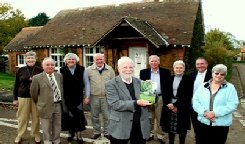
 Local Business, Food, Accommodation
History Group
Local Events
Local Business, Food, Accommodation
History Group
Local Events




 Summary of Castle Rising
Summary of Castle Rising
















Local and Parliamentary Government in Castle Rising
In this website we document 3 types of local and national government in Castle Rising.
The first involved the actual governance and management of the village. Most decisions were made by the Lord of the Manor of the time, who until recently used to live elsewhere, and acted through agents, constables or stewards who lived more locally and carried out the wishes and instructions of the Lord of the Manor. For much of the period the Manor comprised the administration of three parishes, Castle Rising, Roydon and North Wootton, which were under common ownership.
The second was a relic of the ancient Saxon system of “frankpledge” which was a local governance based on a mutual system known as the Baronial Court, comprising the Court Baron, which dealt with the transfer of copyhold land upon inheritance or sale, and the Court Leet, which dealt with petty law and order and the administration of communal agriculture. Although the system had little real power, it persisted within the village for many years and records preserved in the Norfolk Record Office give a valuable insight into village life from the mid seventeenth century until the system was disbanded in 1832.
The third was the relationship between the parish and the Government at Westminster. This had very little to do with the local people, but concerned the influence that those in power, the Walpoles and the Howards had in Westminster and national politics. In the early 16th century the manor of Castle Rising belonged to the royal Duchy of Cornwall. In 1544 Henry VIII exchanged the manor with Thomas Howard, the 3rd Duke of Norfolk, for lands in Suffolk. In 1554 the 4th Duke, a cousin of Queen Elizabeth I, became Lord of the Manor of Rising and soon after (1558) under the assumption that the ancient borough was entitled to two parliamentary representatives, caused an election to be held in Castle Rising, The MPs elected were Sir Nicholas Lestrange and Sir John Radcliffe, the latter being the stepson of the 12th Earl of Arundel, the 4th Duke’s father-
During most of the sixteenth and seventeenth centuries the manor remained in the ownership of the Howard Dukes of Norfolk. They had the power to choose candidates to stand for their Borough in parliamentary elections. Towards the end of the 18th century, however, the Walpole family, who were powerful and politically-
One of Castle Rising’s claims to fame thus stems from its former status as both a ‘Rotten Borough’ and a ‘Pocket Borough’. Before 1832 it was one of the smallest constituencies to send MPs to Westminster and as such became a classic and often quoted example of the iniquities of the parliamentary system. For much of the eighteenth and early nineteenth century Castle Rising had a voting population of fewer than 50 people and yet sent two MPs to Parliament, whereas many large industrial towns which developed rapidly as a result of the industrial revolution had no representation at all. By the beginning of the 19th century, however, there was growing pressure for parliamentary reform. Earl Grey, the leader of the Whig party, steered the electoral reform bill through parliament despite determined opposition from the Tory party, especially in the House of Lords. The Great Reform Act was passed finally in June 1832. Castle Rising was one of 56 boroughs disenfranchised by the Act.